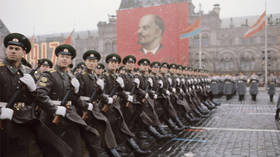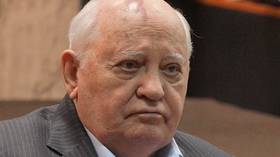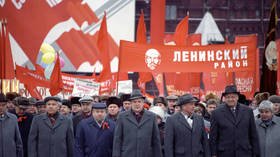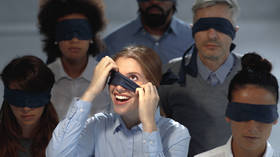Do Russians want the Soviet Union back?

In December 1991, the Soviet Union came to an end. Thirty years on, its last leader, Mikhail Gorbachev, has taken much of the blame. Russians may not want a return to communism, but they blame him for the way it ended.
In Western eyes, Gorbachev is a heroic figure who ended the Cold War and brought freedom to Eastern Europe. In the eyes of ordinary Russians, however, he’s a man who managed in the space of just six years to bring a superpower to its knees and impoverish its people. A poll published last week by the Russian Public Opinion Research Center (VTsIOM) found Gorbachev to be the “most hated person of the Soviet era,” with one in five respondents singling him out. That means the USSR’s last premier is far less popular even than its second – Joseph Stalin, named by just one in 10.
On the surface, this seems strange. Stalin oversaw a traumatic agricultural and industrial revolution, which led to the deaths of millions in the famine of 1932-33. Hundreds of thousands more were killed during the Great Terror of 1937-38. Gorbachev, by contrast, instituted the most rapid and far-reaching liberalization of society in the entirety of Russian history. Under the slogans of glasnost and perestroika, he abolished censorship; allowed the first competitive elections since 1917; released all political prisoners; and enshrined international human rights conventions in Soviet law. Even more than Tsar Alexander II, he deserves to be known as the “Great Liberator.”
Russians, it seems, do not appreciate it. While Gorbachev gave his people formal freedom, he failed to provide them with the means with which to enjoy it. His rule witnessed a catastrophic collapse in the Soviet economy. Gorbachev’s biographer William Taubman writes that by the end of 1989, “only 11 percent of 989 consumer goods monitored by an economic research organization were readily obtainable. Almost entirely absent from stores were televisions, refrigerators, washing machines, most household cleaning products, furniture of all sorts, electric irons, razor blades, perfumes and cosmetics, school notebooks and pencils.” Economically, perestroika was a disaster.
So too were Gorbachev’s political reforms. The Soviet leader abolished Article 6 of the Soviet constitution that designated the Communist Party “the guiding force of Soviet society.” He allowed new political parties to form, created the post of Soviet President, and established an elected parliament. The result was chaos. The Communist Party was the glue holding together the state. Once Gorbachev weakened it, the system unravelled with remarkable speed, destroying the authority of the government in Moscow, and unleashing centrifugal forces that broke the Soviet Union apart.
Arguably, this was all for the good in the long term. The communist system had proven unable to cope with the demands of a modern economy. Some degree of creative destruction was probably necessary to permit a new, more productive, system to develop. Russians today are much freer and, for the most part, wealthier than they were 40 years ago, before Gorbachev. In a sense, it all ended well. But it took a long time for the benefits to become clear, while in the short and medium term the destruction was enormous. And for this Gorbachev deserves a good deal of blame.
The Soviet leader recognized that the system he inherited was not working well. He was genuinely committed to improving it. But he never understood the reasons why it wasn’t working and failed to develop a proper plan to do something about it. Instead, he improvised a set of ad hoc responses, each of which made things worse.
At the heart of the problem was the fact that Gorbachev didn’t have a good grasp of economics and was close to clueless about free markets. Graham Allison, who with Grigory Yavlinsky presented a reform plan to the Soviet leader in 1991, remarked that he and Yavlinsky were shocked by the “dumb questions Gorbachev asked, especially about private property.” Gorbachev sincerely believed in socialism as an economic system, writing in his 1987 book Perestroika, that: “We are conducting all our reforms in accordance with the socialist choice. … Socialism and public ownership, on which it is based, hold out virtually unlimited possibilities for progressive economic processes.”
Consequently, Gorbachev never did anything more than tinker with the socialist system, for instance, by loosening state planning controls. The results were decidedly negative. But instead of questioning the validity of his policies, the Soviet leader concluded that if they weren’t working it must be because conservatives in the Communist Party were sabotaging them. There was no good reason for this conclusion, but having made it Gorbachev determined that the solution was to smash the power of the Party apparatus.
In doing so, he eliminated the only mechanism the state had for regulating the economy, without at the same time introducing the kind of spontaneous regulators that exist in market systems. The result was that things went from bad to worse. As they did so, Gorbachev doubled down on his belief that the cause was bureaucratic sabotage, sped up his political reforms, and so accelerated the system’s collapse.
This was not the only mistake Gorbachev made. He also failed to comprehend the strength of nationalist sentiment in certain regions of the Soviet Union and the fact that political liberalization would likely result in the growth of separatist movements. In a speech marking the 70th anniversary of the Russian revolution, he even went so far as to declare the national problem in the Soviet Union to be “solved.” When confronted with the demands of minority nationalities, Gorbachev was completely at a loss as to how to respond.
In short, the tragic fate of the Soviet Union was to be led by someone who understood that radical change was necessary but who completely misdiagnosed the problem and therefore pushed forward entirely counterproductive solutions.
The Soviet system was both repressive and inefficient. Russians are better off without it. Thirty years on, Russians’ intense dislike of Mikhail Gorbachev is not a sign that they want to go back in time before him. But it does suggest that many of them think that they could have gotten rid of communism in a much less harmful way.
The statements, views and opinions expressed in this column are solely those of the author and do not necessarily represent those of RT.
The statements, views and opinions expressed in this column are solely those of the author and do not necessarily represent those of RT.















